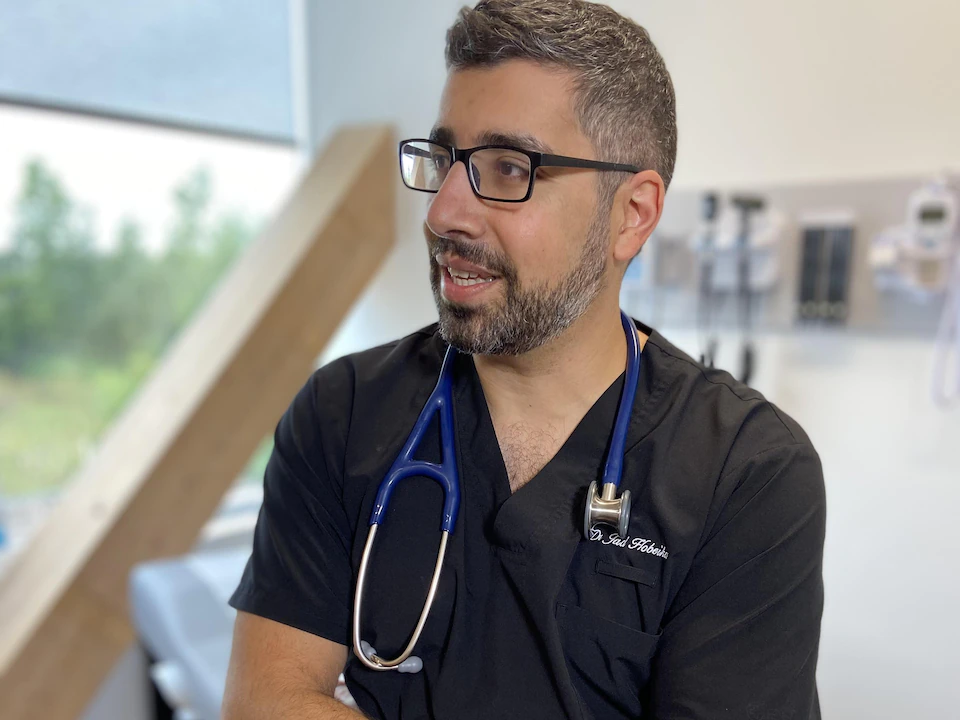
At Fleurimont Hospital of the University Hospital Center of Sherbrooke (CHUS), I waited a year to have breathing tests done. […] And I wanted answers right away
exclaims Mrs. Tardiff.
During a visit to the Laval clinic a few days ago, specialist Dr. Jad Hobeka told him some good news.
We’ve ruled out a lot of cases in your case: no asthma, no chronic obstructive pulmonary disease, no anemia, you’re not deconditioned.
He explained to her.
Ms. Tardiff drove more than seven hours for both of her appointments and paid several hundred dollars. She does not regret her choice. I prioritize my health more than before
Trusts Mrs. Tardiff.
A record 784,000 pending requests
Getting an appointment with a specialist doctor in the public network required unprecedented patience in recent years.
According to the latest data from the Ministry of Health and Social Services (MSSS), there were 784,000 pending requests for all specialties in August, a 60% increase from September 2020.
The average time to get an appointment ranged from 267 to 381 days.
In respirology alone, more than 27,000 requests are pending in Quebec with an average delay of 322 days (46 weeks).
A situation that is the opposite of what the Laval Clinic says it lives by.
Currently, I have one to two weeks for the first appointment
says pulmonologist Jad Hobecka.
A graduate of Internal Medicine and Pulmonology since 2016, he joined Lacroix Medical Group in January 2022 after spending a few years in the public sector, where he was Head of the Department of Pulmonology at the CISSS of Greater Montreal.
For people, we have seen patients with cancers and emergency cases within weeks. Otherwise, for others, we’re talking months or years of waiting […] I am not comfortable with the number of patients on the waiting list
He explains.
According to Dr. Hobeka, There is an accessibility issue in the system that the private sector allows me to fill in a little bit […] For patients who can see us without a referral, we’re adding an offer to get a second opinion, access to expedited appointments, get quick diagnostic tests
.
As Lacroix Medical Group’s Administrative Director, Jean-Nicolas Chagnon, points out, There is a demand […] The growth is exponential every year
.
People need services quickly and we provide complementary access to the public network
He adds.
A nurse practitioner specializing in mental health joined the group at the beginning of the summer along with a general practitioner.
Both appreciate the professional freedom their employer gives them and debunk the myth that the private sector is only frequented by the rich.
On the contrary, we see everything, even patients on social assistance have saved to come and see
Émie Gervais has been a general practitioner in the private sector since she obtained her diploma six years ago.
After humble beginnings in the Quebec region, Lacroix Medical Group now has 90 doctors in ten clinics across Quebec, two operating rooms, a private laboratory and nearly a hundred employees.
555 doctors bill without going through RAMQ
Quebec has a large number of doctors moving into the private sector. Sometimes they have to practice full-time there, if not alternately with their practice in the public network.
According to recent data from the Régie de l’assurance maladie du Québec (RAMQ), the number of medical professionals jumping into the private sector has increased by 55% to 178 doctors in the past five years.
Not only dermatologists, plastic surgeons but also anesthesiologists, gynecologists, radiologists, psychiatrists and some pulmonologists like Dr. Hobeka.
Family physicians are also likely to enter the private sector.
In the last five years, their number has increased by 27% to 377 doctors.
Overall, the percentage of doctors practicing outside the health insurance scheme approaches 3%, but they were less than 2% in the mid-2010s.
There are over 21,000 doctors in Quebec.
A doctor who decided to work in the private sector as a doctor Not participating
In particular, RAMQ should be informed that its patients fully anticipate the fees and post the rates in the office waiting room.
According to data from MSSS, there are 22 specialized medical centers where non-participating doctors practice exclusively.
reactions
In March 2022, the group Médecins québécois pour le régime public published a press release recalling their concern about the ambitions of the private sector.
” Every healthcare professional working in the private sector is one less healthcare professional in the public network. »
A doctor working in the public and private sectors may refer his own patients seen in the public sector to provide care in the private sector and increase his income. […] This raises important ethical issues through the blatant conflict of interest that arises
He wrote.
At the Montreal Economic Institute, we instead advocate liberalization of the health care system, particularly Ban on fake health insurance lifted
Also Constraints on the combined practice of health professionals
.
In 2005, the Supreme Court of Canada ruled in the Chaully decision that Quebecers can obtain private insurance when they do not have access to public health care within a reasonable time.
The Health Insurance Act was later amended to allow private insurance, but only for knee, hip or cataract surgeries.
Party positions
Since the election campaign started.. Many political parties have spoken Increasing or decreasing the outsourcing of surgeries to the private sector using the health insurance card. A phenomenon that has reached about 15% of volume since the pandemic began.
The Conservative Party of Quebec (PCQ), in particular, Regular explorers
Quebecers are given the free option to subscribe to complementary private insurance to access health care already covered by a health insurance plan.






More Stories
An Air Canada flight turned around midway to France
Fewer jobs for young people
Ban this bad habit immediately!